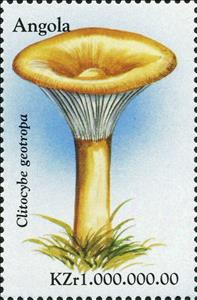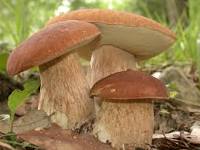Stamp: Clitocybe geotropa. (Angola 1999)
Clitocybe geotropa. (Angola 1999)
23 September (Angola ) within release Mushrooms goes into circulation Stamp Clitocybe geotropa. face value 1000000 Angolan kwanza
| Stamp Clitocybe geotropa. in catalogues | |
|---|---|
| Michel: | Mi:AO 1413 |
| Stamp Number: | Sn:AO 1102h |
| Yvert et Tellier: | Yt:AO 1303 |
Stamp is square format.
Also in the issue Mushrooms:
- Se-tenant - Mushrooms face value 8*1000000;
- Stamp - Morchella crassipes. face value 1000000;
- Stamp - Boletus rufescens. face value 1000000;
- Stamp - Amanita phalloides. face value 1000000;
- Stamp - Collybia iocephala. face value 1000000;
- Stamp - Tricholoma aurantium. face value 1000000;
- Stamp - Cortinarius violaceus. face value 1000000;
- Stamp - Mycena polygramma. face value 1000000;
- Stamp - Psalliota augusta. face value 1000000;
- Se-tenant - Mushrooms face value 8*1000000;
- Stamp - Amanita muscaria. face value 1000000;
- Stamp - Boletus aereus. face value 1000000;
- Stamp - Coprinus comatus. face value 1000000;
- Stamp - Amanita rubescens. face value 1000000;
- Stamp - Cortinarius collinitus. face value 1000000;
- Stamp - Boletus satanas. face value 1000000;
- Stamp - Lepiota procera. face value 1000000;
- Stamp - Clitocybe geotropa. face value 1000000;
- Se-tenant - Mushrooms face value 8*1000000;
- Stamp - Russula nigricans. face value 1000000;
- Stamp - Boletus granulatus. face value 1000000;
- Stamp - Mycena strobilinoides. face value 1000000;
- Stamp - Amanita caesarea. face value 1000000;
- Stamp - Amanita muscaria. face value 1000000;
- Stamp - Boletus crocipodius. face value 1000000;
- Stamp - Russula virescens. face value 1000000;
- Stamp - Lactarius deliciosus. face value 1000000;
- Souvenir Sheet - Psalliota haemorrhoidaria. face value 5000000;
- Stamp - Amanita caesarea face value 1,250,000;
- Stamp - Psalliota xanthoderma face value 1,250,000;
- Stamp - Coprinus comatus face value 1,250,000;
- Souvenir Sheet - Psalliota haemorrhoidarius face value 5,000,000;
- Stamp - Boletus luteus face value 1,250,000;
- Stamp - Psalliota haemorrhoidarius face value 5,000,000;
- Stamp - Mycena lilacifolia face value 5,000,000;
Stamp Clitocybe geotropa. it reflects the thematic directions:
A mushroom (or toadstool) is the fleshy, spore-bearing fruiting body of a fungus, typically produced above ground on soil or on its food source. The standard for the name "mushroom" is the cultivated white button mushroom, Agaricus bisporus; hence the word "mushroom" is most often applied to those fungi (Basidiomycota, Agaricomycetes) that have a stem (stipe), a cap (pileus), and gills (lamellae, sing. lamella) on the underside of the cap. These gills produce microscopic spores that help the fungus spread across the ground or its occupant surface. "Mushroom" describes a variety of gilled fungi, with or without stems, and the term is used even more generally, to describe both the fleshy fruiting bodies of some Ascomycota and the woody or leathery fruiting bodies of some Basidiomycota, depending upon the context of the word. Forms deviating from the standard morphology usually have more specific names, such as "bolete", "puffball", "stinkhorn", and "morel", and gilled mushrooms themselves are often called "agarics" in reference to their similarity to Agaricus or their order Agaricales. By extension, the term "mushroom" can also designate the entire fungus when in culture; the thallus (called a mycelium) of species forming the fruiting bodies called mushrooms; or the species itself.

